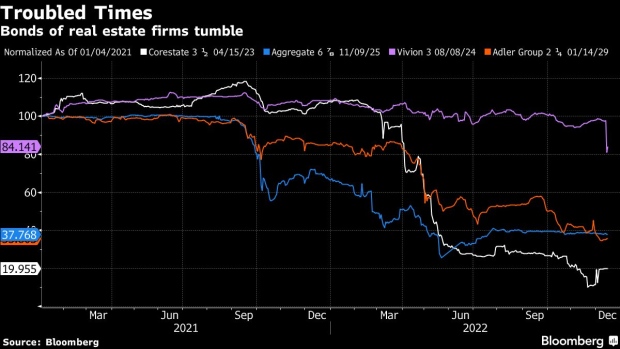
(Bloomberg) — As the tide goes out on an easy money era that inflated Europe’s real estate market, some of the world’s most-feared short sellers have turned their attention to the region’s landlords.
Vivion Investments this week became at least the fifth European real estate company publicly lambasted by short sellers in little over a year after Muddy Waters published a critical report. The company, which owns hotels and offices in Germany and the UK, joins a list that also includes Germany’s Adler Group SA, UK-based Civitas Social Housing Plc and Home REIT Plc as well as Swedish landlord Samhallsbyggnadsbolaget i Norden AB, or SBB.
The scrutiny comes just as rapidly rising interest rates are hitting property values and threatening landlords who need to refinance mountains of cheap debt. Much of that debt was issued through bond markets that had been distorted by the European Central Bank’s asset purchasing programs that kept borrowing costs down and boosted demand for riskier issuers.
“This sector was almost nonexistent in the credit index 10 years ago,” said Benoit Soler, a high yield fund manager at Keren Finance. “Then we had quantitative easing which allowed the sector not only to exist but then balloon in size.”
Short Targets
At the heart of Muddy Waters’ report are allegations that Vivion uses undisclosed related parties to operate its hotels, paying artificially inflated rents. The higher rents justify higher property valuations, against which the company has been able to borrow liberally. Vivion said the report was inaccurate and flawed.
Landlord Vivion Pushes Back on Short Seller Muddy Waters (1)
Adler was targeted by Viceroy Research in October 2021 with a slew of allegations that also focused on inflated valuations and undisclosed related party deals. KPMG probed the allegations and cleared the company of systemic fraud but was unable to refute all of the claims. Adler has denied the accusations, but has struggled to find an auditor after KPMG quit in May.
Viceroy also targeted SBB, arguing it was under reporting its relative indebtedness. SBB has since sold off swathes of its portfolio to reduce its debt load and to prove the robustness of its valuations. SBB published details of its cash flow in July as a rejoinder to claims that questioned its accounting. The firm has rejected the allegations against it.
The ripple effects of the short seller attention are already being felt by companies with ties to those landlords, including Aggregate Holdings SA, Corestate Capital Holding and Accentro Real Estate AG, triggering a wave of debt restructuring across the sector after those firms struggled to meet debt payments.
“It’s been quite easy for landlords to lever up massively as underlying prices were soaring every year,” Keren Finance’s Soler said. “Murky managers joined the ECB’s party.”
The breadth of allegations, that span the continent from the UK to Sweden, have helped accelerate a sharp sell-off in European real estate stocks and bonds, as concerns about governance add to the sector’s woes.
Short interest in the real estate sector has increased globally over the past month, making it the second most-shorted area after consumer services, based on market capitalization, according to Matt Chessum, director at S&P Global market intelligence.
Some companies with robust businesses have also been caught up in the selloff.
“There’s been indiscriminate selling and you’ve got around 20 mid-cap companies, which are fundamentally sound and/or where we’ve identified pockets of value, getting lumped together with others that are getting crushed for a variety of other reasons,” said Saul Goldstein, chief executive officer and founder of private equity firm Activum SG Capital Management.
To defend their businesses, a string of real estate companies have embarked on plans to restructure their debt this year, with varying degrees of success.
Adler is facing opposition to a plan that would give it fresh capital and extend debt maturities. Meanwhile, Aggregate, a shareholder of Adler, is rushing to refinance its debt and has asked bondholders of its subsidiary Vic Properties to accept a debt repayment postponement.
Investors have agreed to provide €10 million in short-term bridge financing Corestate, which has financed deals for Adler and is also restructuring its debt. Accentro, which Adler owns a minority stake in, is finalizing negotiations with its bondholders to extend the maturity of a bond.
In some cases, the short-seller allegations have effectively shut landlords off from capital markets, meaning asset sales have become the only option as they face looming debt maturities. That’s proving an uphill battle against a backdrop of rising interest rates that are beginning to hit property values and leave potential buyers wary.
Still, some private equity firms are beginning to take the plunge. SBB announced the sale of a stake in a portfolio of education buildings to Brookfield for about €1 billion last month. Blackstone Group Inc. agreed to buy a portfolio of warehouses from another Swedish landlord, Corem Property Group AB, for 5.35 billion kronor ($521 million), according to a statement Thursday.
©2022 Bloomberg L.P.





